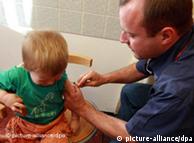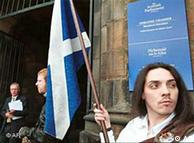Topsy-Turvy Christmas Foolery

Mark McNulty
Heyyy: Henry Winkler is Captain Hook in a “Peter Pan” pantomime in Liverpool, England. These musical comedies are a Christmas tradition dating to 1607. More Photos >
Published: December 21, 2009
LIVERPOOL, England — Yes, it is the Fonz. Yes, he is wearing a Puss ’n Boots hat and a frock coat that Louis XIV would have been proud to call his own. Yes, he is glaring at the audience and hissing, “If you don’t shut up, I’m going to come down and poison your ice cream.”
Even more interestingly, he is doing it of his own free will.
To the untrained observer, Henry Winkler’s appearance as the villainous Captain Hook in a pantomime of “Peter Pan” here might seem to be a dismaying comedown — akin to, say, Leonard Nimoy’s appearing in a production of “You’re a Good Man, Charlie Brown” in Buffalo.
But that would be a complete misreading of the situation.
Pantomimes — recastings of old children’s stories with vaudeville, audience participation, puns, singing and cross-dressing — are an honorable, even essential, part of the British Christmas season. Meant to appeal to all ages, they are enduringly popular, flamboyantly silly and, if done well, hugely lucrative. They often feature big stars.
In 2004 and 2005 the great Shakespearean actor Ian McKellen slapped on a frilly dress and a trowelful of makeup to play the Widow Twanky in “Aladdin.” (Most pantomimes feature a man in drag, a character known generically as the dame.) In 2007 Stephen Fry wrote a double-entendre-laden pantomime of “Cinderella” at the Old Vic, and a year earlier the provocative playwright Mark Ravenhill revised the classic pantomime “Dick Whittington and His Cat” for the Barbican.
Occasionally, American actors appear, lured by the prospect of a big paycheck and the comforting thought that if they make fools of themselves, nobody back home will know. In recent years Steve Guttenberg, Mickey Rooney and Patrick Duffy have all played Baron Hardup in productions of “Cinderella.” This year Pamela Anderson, sparsely clad as always, is performing as the genie in “Aladdin” in London.
Mr. Winkler is a perennial. This is his fourth year as Captain Hook, after productions in Woking, Wimbledon and Milton Keynes.
“This is ‘Peter Pan’ bent to the left,” he said. “There’s dancing, there’s singing, there’s sword fighting — every single thing I learned at Yale in the drama school I’m applying here.” The way the children in the audience boo at him; the way they yell, “He’s behind you!” when the ticking crocodile appears; the way they clap to demonstrate their belief in fairies and restore Tinkerbell to life — he revels in it all.
Mr. Winkler, 64 and soft-spoken, was chatting in his dressing room at the 2,381-seat Empire Theater the other day after a sold-out evening performance. (He is doing two shows a day, six days a week, through Jan. 3.) He was wearing civilian corduroys. His fake hook was neatly stowed; his long black wig was next door, being recurled.
When he was first asked to be in a pantomime, Mr. Winkler said, he had no idea what the producers were talking about.
“They called me and said, ‘Listen, it’s a pantomime; you don’t know what it is, and there’s no way to explain it,’ ” he said. “ ‘You’ll play Captain Hook.’ ”
He had a moment of doubt. “I thought to myself, ‘Well, I don’t know if the English actors would accept an American,’ ” he recalled. “ ‘I don’t know whether they’d allow me to take part in this tradition they’ve had since 1607.’ So the easy way would have been to say no, and then I could sit at home. And then I thought, ‘You know, you have got to take a shot at it.’ ”
What he found, he said, was that “warmth and respect, kindness and professionalism are international.” Also, he likes his band of dancing pirates and enjoys thinking up new insults with which to establish his dastardliness. In its review, The Liverpool Daily Post praised his “swashbuckling energy” and called him a “wonderfully hammed-up pantomime villain.”
Mr. Winkler is hugely famous here; “Happy Days,” it turns out, was as big a deal in Britain as it was in the United States. People stop him in the street. “Mostly, they just want hugs,” he said. Once a busful of Liverpool commuters drove past, all waving at him. The Liverpool Echo chronicles sightings around town in a “Winkler Watch” column.
It is not as if he needed the work. Mr. Winkler appears regularly in movies and on television, most memorably in recent years as Barry Zuckerkorn in the television series “Arrested Development.” He is also the co-author of the Hank Zipzer series, about an underachieving fourth grader, which has sold about three million copies, he said.
“Happy Days” ended its first run 25 years ago, but wherever Mr. Winkler goes, the Fonz goes too. That leather-jacketed rebel was the show’s best-known character. “He is the foundation of the rest of my life,” Mr. Winkler said.
Pantomimes reflect a strange paradox of the British national character: that people can be at once so uptight and so gleefully, childishly uninhibited. Amid all the mayhem, “Peter Pan” is full of topical references to things like the recession and the television talent show “The X Factor.” For audience members of a certain era, there are also quicksilver allusions to “Happy Days.” In one scene Captain Hook shifts his weight back, turns his palms up and intones, “Heyyy” — still the essence of cool after all these years.
After the interview, Mr. Winkler signed autographs for a clutch of fans shivering by the stage door. Then he climbed into a car and was whisked away, ready to return 13 hours later.
“Are we doing ‘Macbeth’?” he asked rhetorically. “No, but we’re doing a wonderful, joyous production of ‘Peter Pan.’ I cannot imagine that you could have more fun than doing this.”





















